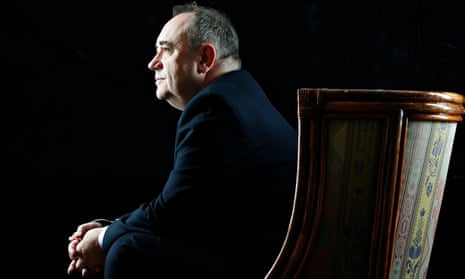Alex Salmond has been labelled a “paranoid loser” by a former BBC chairman, following the former Scottish National party leader’s criticism of the corporation’s coverage of the Scottish independence referendum.
Sir Christopher Bland urged the BBC to mount a robust defence of its journalism, after Salmond compared the corporation’s independence referendum coverage to a “state broadcaster” screening propaganda.
“I haven’t yet seen, other than the rather feeble [BBC] corporate affairs response … somebody taking him on and saying ‘really, Salmond, you’re a paranoid loser and you really shouldn’t insult the BBC like that’,” Bland told the Voice of the Listener & Viewer (VLV) autumn conference in London on Tuesday afternoon.
Salmond, speaking to the Daily Record on Monday, accused the BBC of helping to secure a no vote in September’s Scottish independence referendum. “There is a difference between being a public service broadcaster and a state broadcaster, and I don’t think the people at the top of the BBC understand the difference. That is a tragedy,” he said.
Bland, who chaired the BBC board of governors between 1996 and 2001 and is also a former BT chairman, was speaking at a VLV conference session on the challenges facing recently appointed BBC Trust chair Rona Fairhead.
Bland said the trust should not defend the indefensible over charter renewal. “I don’t think the existing structure of the trust and the BBC is defensible. All organisations tend to perpetuate themselves; it would be a great thing if the trust could say ‘This isn’t working, here is how it should work going forward’. A different model, plainly, is needed.”
He advised Fairhead not to appear on the Today programme on Radio 4 or BBC2’s Newsnight: “Don’t think these people are your friends – they are not.”
Richard Ayre, a BBC trustee and former director of editorial policy at the corporation, said it should be ready to defend its independence publicly in an election year, more than in the past. “The BBC has a duty to be robust, to make difficult programmes. Sometimes it will make mistakes – we should never defend its mistakes but we should defend the BBC’s right to make mistakes and learn from them,” he said.
Ayre said Fairhead needed to spell out the choices the BBC would have to make after 2016, when it enters a new charter and licence fee funding period. “Audiences will get what the licence fee pays for. We’ll need to spell out that what goes and what stays on the BBC will depend on the BBC being financed to produce the services that the audience wants.”
Will Wyatt, a former chief executive of BBC Broadcast who retired from the corporation in 1999, advised Fairhead to “begin to prepare for her own demise”. He said the trust was a “lash-up”, was too large and had never been coherent. “No one really knows who is in charge of the BBC.”
There were too many former BBC executives on the trust, Wyatt said – a charge later rejected by Ayre, who said only two of the 12 fell into that category.
Wyatt added: “Spell it out – let people know that you cannot do this [cut costs] forever and still expect programmes to be high quality. Be bold, get up, stand up, shout … Don’t fear it Rona, get out there and do it.”
- This article was amended on 18/11/2014 to clarify a paraphrasing of Richard Ayre’s comments after listening to a transcription









Comments (…)
Sign in or create your Guardian account to join the discussion